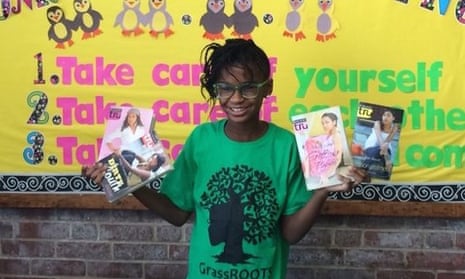An 11-year-old girl who was frustrated about only being given unrelatable books to read at school has reached her goal of finding 1,000 “black girl books” after starting the campaign #1000blackgirlbooks.
Marley Dias, who goes to St Cloud elementary school in West Orange, New Jersey, began her drive in November after she told her mother she was tired of the books that she was being given at school. Her mother, Janice Johnson Dias, asked her what she was going to do about it, and Dias decided to launch her drive with the help of her mother, who is the co-founder of the social action organisation GrassROOTS Community Foundation.
“I started this because in my fifth-grade class I was only able to read books about white boys and their dogs. I understood that my teacher could connect with those characters, so he asked us to read those books. But I didn’t relate to them, so I didn’t learn lessons from those stories,” Dias told the Guardian. She has now exceeded her goal after an outpouring of support – both online, where the #1000blackgirlbooks hashtag has taken off, and offline.
At Stacked Books, author and blogger Kelly Jensen raised nearly $3,000 (£2,000) in donations to help “this fabulous girl collect the books she wanted to meet her goal”, sending Dias a huge range of picture books, young adult titles and more.
Bookseller Barnes & Noble also donated books to the drive, saying that “some books introduce us to characters who are different from us, allowing us to see the world from a new perspective. But for children in the process of figuring out who they are, and who they want to be, it is just as important to also read stories about characters they can relate to, and see themselves in.”
When she had collected around 700 books, Dias also appeared on US chat show Ellen, where she was given a laptop, and a cheque for $10,000 donated by Shutterfly.
Some of her own personal favourites, said Dias, are the award-winning Brown Girl Dreaming by Jacqueline Woodson, One Crazy Summer by Rita Williams-Garcia, Chains by Laurie Halse Anderson and I Love My Hair by Natasha Anastasia Tarpley.
“In the beginning, I was concerned we weren’t going to reach our goal, and now there are strangers thanking me for doing this,” she said. “It makes me feel happy because there are strangers on Facebook who are so thankful and say ‘because of this book drive my son wants to do this’ and my ‘daughter wants to do that’, and I think it’s kind of cool. It was kind of weird at first that people knew my name and say they heard about the cause and thank me – but now it’s kind of more like the norm. It’s fun.”
Now that she has exceeded her aims for #1000blackgirlbooks, Dias hopes she will continue to receive donations, so she can pass them on “to other schools where students are experiencing the same frustration”.
“We are having a book festival and donating them to the parish of St Mary in Jamaica where my mother is from,” she said. “I also plan on donating to schools in Newark, Philadelphia and West Orange. The Lee school in Philadelphia, Speedway elementary school in Newark, and in West Orange my elementary school … where my frustration began.”
Writing on Stacked Books, Jensen said she was “thrilled” to have been able to send so many books Dias’s way, “but it didn’t hit me how difficult finding ‘black girl books’ truly was until I’d exhausted the obvious, exhausted the less obvious, and still have some money left over to find further titles.
“I am eager to see how Marley completes this dream of hers, as well as what her library will look like, but I’m also saddened to see so clearly the very thing she was talking about (and that so many others have and continue talking about): these books are not out there, not obvious, and that needs to change.”
According to statistics gathered by the Cooperative Children’s Book Centre, of 3,500 children’s books surveyed in 2014, just 84 were by Africans or African Americans, and just 180 featured African or African American characters.
“Books transmit values. They explore our common humanity. What is the message when some children are not represented in those books?” wrote Walter Dean Myers, the late children’s author, in the New York Times in 2014. “Where are black children going to get a sense of who they are and what they can be? … I’m told that black children, and boys in particular, don’t read. Small wonder. There is work to be done.”

Comments (…)
Sign in or create your Guardian account to join the discussion